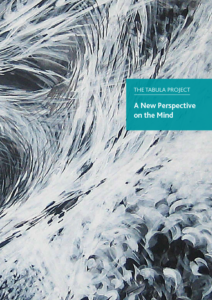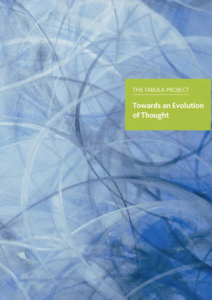Greener Vision applies insights from The Tabula Project to the challenge of tackling the climate crisis and developing policies to achieve net zero. The Project’s overall objective is to provide a new perspective on the mind so we might improve how we think and evolve as a society. The paintings depict states of consciousness and thought, and the development of the project is informed by extensive research across a range of disciplines.
Vision

Change is possible but we must start with ourselves
 The Tabula Project: A New Perspective on the Mind describes the development of the paintings and how they relate to different states of consciousness and thought.
The Tabula Project: A New Perspective on the Mind describes the development of the paintings and how they relate to different states of consciousness and thought.
The level of threat we live with is greater than ever, but the mindset that got us into this predicament won’t get us out of it. If we want to change behaviours we need to change the premises which led to them. We need to change how we think.
We need a shift in mindset from one where we are narrowly focused on individual desires, inward looking, preoccupied by our own repetitive thoughts and unable to live in the present to one where we are at one with our society, the environment and world around us.
- We have developed a deeply exploitative ethos as the basis for our actions.
In The Future We Choose, Christiana Figueres and Tom Rivett-Carnac argue that change of the magnitude required will not be possible all the while we are informed by the same state of mind that has been predominant in the past. Over time we’ve developed a deeply exploitative ethos as the basis for our actions. We must now adapt to the scarcity of resources we have caused, and the rapidly diminishing space left in our global atmosphere for carbon emissions. To do this we must prioritise collaboration. “A shift in consciousness may sound grandiose to some, insufficient to others”.[i]
- A greater level of self-awareness is needed if we are to improve our decision making.
We may imagine that we are capable of seeing things as they really are, and that our own view is the “objective” one. However, we are laden with preconceptions and unexamined assumptions which colour and distort our view of everything. Our perspective is impaired if we are unable to recognise this. As anthropologist Gregory Bateson observed “very few people seem to realize the enormous theoretical power of the distinction between what I “see” and what is actually out there”.[ii]
- We need to encourage people to do the right things for the right reasons.
The reasons for ecological policies are as important as the policies themselves and these need to be communicated clearly to people. Otherwise, politicians will struggle to gain the mandate they need to take future difficult decisions[iii]. ‘Stealth strategies’ – trying to substitute low-carbon behaviours for high carbon ones without people noticing – are inherently self-limiting as by definition they do not make the case for change (Willis).[iv] Political expediency is self-defeating.
- We need to move beyond polarizing notions of good and evil.
Compassion and understanding are needed if we are to tackle our most serious social, environmental and systemic problems. Sociologist Norbat Elias suggests that we avoid emotionally charged ideological evaluations and take a “detour via detachment”.[v] We already know that much depends on achieving a better balance between self-restraint and self-fulfillment, but such a balance still eludes us. We know that we are able to live a more civilised existence, but not how to bring it about.
- How will we achieve a more stable social order?
Stuart Kauffman, the pioneering complex systems researcher and thinker, suggests that self-organization is the root source of order. “Order is free, it just happens”. He points to the importance of cooperation over competition, creating a state of dynamic equilibrium. How do we avoid potential catastrophic consequences? He suggests all we can do is “be locally wise, even though our own best efforts will ultimately create the conditions that lead to our transformation to utterly unforeseen ways of being”.[vi]
Changing behaviour changing how we think
 The Tabula Project: Towards an Evolution of Thought contains a summary of the main research findings.
The Tabula Project: Towards an Evolution of Thought contains a summary of the main research findings.
If we consider the many self-created challenges we face it is not unreasonable to conclude that there is something wrong with how we think.
Anthropogenic climate change, social injustices and inequalities, widening extremes of wealth and poverty, inhumane treatment of each other and other species, wars and acts of terrorism, unsustainable plundering of the planets resources. The list goes on.
The question is why do we keep repeating the same mistakes? What can we do to change things for the better?
- How we think is inextricably linked to our sense of identity, which is a product of our history, of our individual and collective experience.
To understand knowledge, we need to know the characteristics of the groups which create and use it. This is a central tenet of Thomas Kuhn’s seminal work The Structure of Science Revolutions. One of the legacies of Kuhn’s work is the concept of the “paradigm”[vii]. All knowledge depends on preconceptions which may need to be examined or altered, or even rejected, if one wants to progress in any given field. Alfred Korzybski famously put forward the idea that “the map is not the territory”. No map shows all its presumed territory, and crucially it leaves out the map maker[viii].
- We need a radical realignment of how we perceive ourselves in relation to others and the environment on which we depend.
There are serious limitations to a view of the world in which individuals are separate from society and the world they inhabit. Humans need to be understood as predominantly social and connected to the ecosystem. The cumulative effect of how we live our lives today is putting a massive strain on our ecological system. The complexity sciences provide useful insights into global trends. The modern world is unsustainable and on the way to a bifurcation point (Lazlo).[ix]
- We need to take a systemic approach and address the underlying causes of problems.
We pay too much attention to the symptoms of problems and not enough to the system. Treating the symptom makes the world a safe place for the pathology, such as ‘curing congestion’ by building more roads. Courses of action adopted for short term gain can by default be adopted for the long term often with disastrous consequences (Bateson)[x]. Ideas have a self-fulfilling power of their own and when they go unexamined can become hard-wired habits difficult to reverse.
- We need to think and act in a global context and for the long term.
We are wired to focus on that which will serve our immediate self-interests. But by focusing on narrow self-interest and the “common sense” dictates of our individual consciousness we make unwise decisions. The result is short term expediency and a lack of systemic wisdom. Our decision making is flawed when it ignores our interdependence with each other and the biosphere. The ‘unit of survival’ is the organism plus its environment (Bateson)[xi].
- We need a new paradigm.
Professor Jackson defines prosperity as our ability to flourish within the ecological limits of a finite planet.[xii] GDP growth can no longer be the priority. Ervin Lazlo points to the obsolescence of modern beliefs such as: the “law of the jungle”, the “invisible hand”, and “a rising tide lifts all boats”. We need to move beyond liberalism and communism to a 3rd strategy whereby we co-evolve the person and society, optimising individual freedom and autonomy and ensuring at the same time social justice and equity.[xiii]
Guiding principles for a greener future
Support life – set goals that serve the widest possible good and support life on earth.
Do the right thing – think through the long-term consequences of every decision and action.
Take action for the right reasons – thoroughly examine the motivations for every decision and action.
Be fully present – in the moment and conscious of all one’s thoughts and feelings.
Learn, grow, evolve – learn from every experience, grow through challenges and evolve to highest potential
Tabula Rasa Part XVI, acrylic on board, 1995-2015
Our most important goal is to support life. We need to give greater focus to the long term the consequences of all our actions and behaviours. We should strive to do the right thing. Change is possible but we must start with ourselves. Our aim is to be fully present and to learn, grow and evolve from all our experiences.
Doing the right thing means supporting life on earth and working collectively for the common good. But it is not enough just to do the right thing. The right thing needs to be done for the right reasons. The rationale is as important as the policies and behaviours themselves. Self-awareness is key. It is important to have sound motivations, to examine honestly the reasons for every decision and action.
This leads to the need to focus only on the things that matter. Understanding which things matter is a process of ever deepening awareness. There are some useful tools for assessing this. Is something of intrinsic or extrinsic value? Appearances are not necessarily good indicators of intrinsic value. Monetary value is extremely misleading and is basically a different value system.
Intrinsic value usually means of lasting value, sustainable and supporting peace and contentment. The things that matter support life. Things that matter also support a good quality of life, such as relationships, and time to connect and reflect.
Another component of focussing on things that matter is having a sense of meaning and purpose. It is not necessary to have answers to questions concerning the meaning life, it is just important to be mindful of the big questions, and to ‘stay with the unknowing’ (Keats). Keeping open and inquisitive keeps one’s mind tuned to its highest frequency. It is an aspiration for us to know one day what Einstein once called “the mind of God”.
Socrates once said, “The unexamined life is not worth living!” Ever deepening awareness comes from a combination of experience, leading an examined life, and time to quieten the mind. Enlightenment is a state of continuous renewal. One might say that the purpose of life is to learn and grow, in order that we might evolve as individuals and collectively. That the ultimate purpose of life is the continuation of life itself.
[i] Christiana Figueres and Tom Rivett-Carnac, The Future We Choose, published by Manilla Press, 202
[ii] Gregory Bateson, Sacred Unity: Further steps to an ecology of mind, Harper Collins, 1991
[iii] Gregory Bateson, Sacred Unity: Further steps to an ecology of mind, Harper Collins, 1991
[iv] Rebecca Willis, Too Hot to Handle? The Democratic Challenge of Climate Change, Bristol University Press, 2020
[v] Norbert Elias, The Symbol Theory, Sage, London, 1991
[vi] Stuart Kauffman, At Home in the Universe, OUP, Oxford, 1995
[vii] Thomas Kuhn, The Structure of Science Revolutions, 1962
[viii] Alfred Korzybski, Science & Sanity, Fifth Edition, Institute of General Semantics, 1994
[ix] Ervin Laszlo, The Chaos Point: The World at the Crossroads, Piatkus Books Ltd London, 2006
[x] Gregory Bateson, Sacred Unity: Further steps to an ecology of mind, Harper Collins, 1991
[xi] Gregory Bateson, Steps to an Ecology of Mind, 1972, University of Chicago Press, 2000
[xii] Tim Jackson, Prosperity without Growth: Foundations for the Economy of Tomorrow, Second Edition published by Routledge 201
[xiii] Ervin Laszlo, The Age of Bifurcation, Gordon & Breach, 1991

